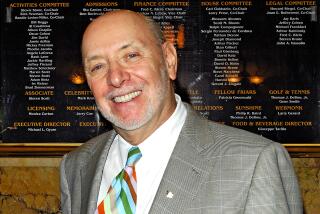Buys Village Voice : Latest Deal Reveals New Side of Stern
NEW YORK — Tough-talking Leonard N. Stern has always been happy to be thought of as the hardest of hard-nosed businessmen. In negotiations, he quibbles over pennies despite his multimillion-dollar fortune, and assaults on competitors by his Hartz Mountain Industries are fabled.
His goal has always been the bottom line.
This week Stern seemed to reveal a new side to his character as he purchased New York’s pugnaciously liberal Village Voice from publisher Rupert Murdoch and declared his interest in nurturing the weekly newspaper’s “journalistic drive and energy.”
Even as he pledged to maintain the paper’s editorial independence, the acquisition set off a lively debate about his plans for the 30-year-old paper, which gained fame nationwide as a counterculture institution.
Some believe that Stern plans to sit back, as did Murdoch, and let the cash from the highly successful paper flow in. Others think the Voice’s $55-million price tag was too high to offer much profit, and they assert that he intends to use the weekly to advance political or business interests.
Charitable Efforts Increase
Still others see the purchase as simply a diversion that may gain new respect for a businessman who has been dogged by controversy. They note that Stern’s charitable efforts have increased in recent years.
“No matter how much money Leonard Stern has made, people still think of it as a ‘dog-food fortune,’ ” one New York acquaintance said. “If you ask me, he’s in it for the prestige.”
The 47-year-old Stern won’t elaborate on his intentions, displaying the same publicity shyness that he has shown since taking over his father’s company in 1959, at age 21. Max Stern founded Hartz Mountain Corp. in 1926 after immigrating from Germany with 2,100 canaries that had been given him to pay off debts.
But it was Leonard Stern who oversaw the greatest growth of the pet food and supplies company, of which he is sole owner. Hartz earned $27 million on revenue of $221 million in 1977, which was the year Stern took it private and the last year for which such figures are available.
The younger Stern was also responsible for the company’s boldest thrust, its venture in developing portions of a sewage-sodden New Jersey swamp known as the Hackensack Meadowlands. The company now owns or leases more than 2,000 acres in the region, just across the Hudson River from New York, and has developed a 165-acre residential area and a 400-acre commercial tract.
These holdings, Manhattan real estate and other assets increased Stern’s net worth to $550 million by last year, according to an estimate by Forbes magazine, which ranked him among the nation’s wealthiest people.
He has faced obstacles as the fortune has grown. Competitors in the pet products industry have sued the company repeatedly, alleging that Harrison, N.J.-based Hartz has regularly engaged in anti-competitive practices to maintain its 75% market share of such things as flea collars and bird food.
Notable among such suits was one brought in 1978 by A. H. Robins of Richmond, Va., maker of Sergeant brand pet products. It alleged that, among other monopolistic practices, Hartz tried to force distributors to carry only Hartz products and illegally offered different prices to competing customers through the use of cash rebates, discounts and special advertising discounts.
The Robins suit was dropped after Hartz paid the competitor $42.5 million in an out-of-court settlement in 1979. The same year, Hartz paid a United Auto Workers local $640,000 in back pay to settle a dispute over alleged anti-union activities.
Last year in Richmond, Va., Hartz Mountain pleaded guilty to federal criminal charges of obstruction of justice, perjury and subornation of perjury in a case that largely grew out of the Robins antitrust suit. In a plea bargain, Hartz paid a fine of $20,000.
Closed Other Magazine
Some worried Voice staff members point to Stern’s first foray into journalism, which occurred last year with his purchase of a glossy, gossipy Manhattan weekly called the East Side Express from Washington publisher Phillip Merrill. Within a month, Stern had closed the magazine, declaring that it would probably take $9 million and four years to make it profitable.
“He was in here one day saying ‘I’ve got deep pockets, your troubles are over,’ and four days later the place was closed down,” said Harriet Fier, who was the newspaper’s executive editor.
Some who have reviewed the Voice’s balance sheets wonder about its future finances. The newspaper earned a healthy $3 million in 1984, although circulation declined to about 150,000 from about 154,000 in 1982. But others who considered bidding for the paper suggested that it will be difficult for Stern to turn profits that justify the Voice’s $55-million price.
Arthur Levitt Jr., chairman of the American Stock Exchange, said this week that he was discouraged from bidding because of the price, which industry sources said represented nine times what Murdoch paid in 1977.
“I don’t know how Stern can make money at that price,” said a magazine publisher who has reviewed the Voice’s finances. “He’s got to be in it for the glamour.”
Associates say Stern has stepped up his involvement in charitable and volunteer activities.
He is a trustee of New York University, his alma mater, which is refurbishing a dormitory to be named after him. Stern has contributed more than $4 million for NYU scholarships, officials said.
New York’s Legal Aid Society named him Citizen of the Year early this year after he contributed $75,000 that was spent to fund a lawsuit to force the city to house more homeless families.
More to Read
Inside the business of entertainment
The Wide Shot brings you news, analysis and insights on everything from streaming wars to production — and what it all means for the future.
You may occasionally receive promotional content from the Los Angeles Times.











